Power to the People - A Sardinia-Piedmont Interactive AAR
- Thread starter ThunderHawk3
- Start date
-
We have updated our Community Code of Conduct. Please read through the new rules for the forum that are an integral part of Paradox Interactive’s User Agreement.
You are using an out of date browser. It may not display this or other websites correctly.
You should upgrade or use an alternative browser.
You should upgrade or use an alternative browser.
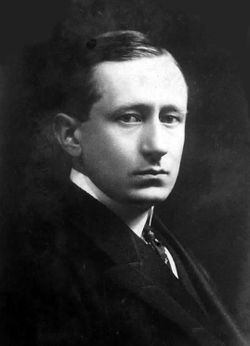
Name: Fiorenzo Rossini
Date of Birth: December 18th, 1883
Place of Birth: Siena, Italy
Class: Politician
Bio: Fiorenzo is the son of Benedetto Rossini, formerly a CDR backbencher who later became a POI backbencher upon the dissolution of the CDR in 1882. With the Revolution of 1886 and the anarchy that followed, Benedetto found himself without a job and was forced to find other means to support his family. Nevertheless, he never gave up hope that Italy would return to democracy one day and transferred this hope to Fiorenzo, who grew up knowing only dictatorship and oppression. As a result, Fiorenzo has always been a firm democrat as well as a moderate socialist, just like his father. He has been severely disappointed with the incompetence of the Italian socialist movement thus far and believes that it needs to be led into a new direction if it is to become a major force once again. With the Amat regime promising a return to democracy, albeit in a more limited form, Fiorenzo knows that he will soon have an opportunity to enter politics and make his impact on the Italian political scene.
Date of Birth: December 18th, 1883
Place of Birth: Siena, Italy
Class: Politician
Bio: Fiorenzo is the son of Benedetto Rossini, formerly a CDR backbencher who later became a POI backbencher upon the dissolution of the CDR in 1882. With the Revolution of 1886 and the anarchy that followed, Benedetto found himself without a job and was forced to find other means to support his family. Nevertheless, he never gave up hope that Italy would return to democracy one day and transferred this hope to Fiorenzo, who grew up knowing only dictatorship and oppression. As a result, Fiorenzo has always been a firm democrat as well as a moderate socialist, just like his father. He has been severely disappointed with the incompetence of the Italian socialist movement thus far and believes that it needs to be led into a new direction if it is to become a major force once again. With the Amat regime promising a return to democracy, albeit in a more limited form, Fiorenzo knows that he will soon have an opportunity to enter politics and make his impact on the Italian political scene.
All factories in Romanga = 105 - (5 PP * 5) = 80 PP
All factories in Puglia = 80 PP - (5 PP * 7) = 45 PP
Lol invalid
Last edited:
((New point of clarification - you can't unionize closed factories.
EDIT: Super-duper clarification, a factory is judged to be open if it appears in the screenshots as open - rather than closed or under construction - and at no point before.))
EDIT: Super-duper clarification, a factory is judged to be open if it appears in the screenshots as open - rather than closed or under construction - and at no point before.))
Last edited:
((TH3 wanted a factory list so here it is:
Michelangelo Ezzo mrlifeless:
Firehound (In Trust)
Nodscutorr:
Silvio Ferrabino (Terraferma)
Donato Ceruso (Canadian) (In Trust)
Otto (In Trust, profits confiscated)
I shall reopen my factories at the cost of £14K
Michelangelo Ezzo mrlifeless:
Piedmont fabric
Piedmont Regular clothes
Lombardy dyes
Lombardy electric gears
Romagna fabric
Romagna Regular clothes
Savoy Regular clothes
Toscana Automobiles
Campania Fabric
Campania Regular Clothes
Campania Luxury Clothes
Campania Dyes
Lazio Regular Clothes
Lazio Luxury Clothes
Piedmont Regular clothes
Lombardy dyes
Lombardy electric gears
Romagna fabric
Romagna Regular clothes
Savoy Regular clothes
Toscana Automobiles
Campania Fabric
Campania Regular Clothes
Campania Luxury Clothes
Campania Dyes
Lazio Regular Clothes
Lazio Luxury Clothes
Firehound (In Trust)
Piedmont ammunition
Puglia ammunition
Puglia steamers
Romagna small arms
Sardinia ammunition
South Tirol small arms
Toscana small arms
Venice Steamers
Sicily artillery
Sicily explosives
Lazio artillery
Lazio ammunition
Campania small arms
Campania artillery
Emilia ammo
Puglia ammunition
Puglia steamers
Romagna small arms
Sardinia ammunition
South Tirol small arms
Toscana small arms
Venice Steamers
Sicily artillery
Sicily explosives
Lazio artillery
Lazio ammunition
Campania small arms
Campania artillery
Emilia ammo
Nodscutorr:
Emilia Machine Parts
Lazio Steel
Lombardia Steel
Lombardia Machine Parts
Toscana Steel
Lazio Steel
Lombardia Steel
Lombardia Machine Parts
Toscana Steel
Silvio Ferrabino (Terraferma)
Piedmont Liquor
Piedmont Wine
Lombardia Wine
Venetian Wine
Piedmont Wine
Lombardia Wine
Venetian Wine
Donato Ceruso (Canadian) (In Trust)
Sardinia cement
Sardinia glass
Puglia glass
Savoy cement
Toscana cement
Toscana glass
Venice glass
Campania cement
Sardinia glass
Puglia glass
Savoy cement
Toscana cement
Toscana glass
Venice glass
Campania cement
Otto (In Trust, profits confiscated)
Puglia paper
South Tirol lumber
Lazio luxury furniture
Emilia lumber
and the goverment will open all the factories that are held in trust, taking the factories profits untill the money in made back (except for otto we get everything until (if) he gets out of jail). If you want to buy factories or get yours back please contact me. ))South Tirol lumber
Lazio luxury furniture
Emilia lumber
I shall reopen my factories at the cost of £14K
Last edited:
((Additional clarification on the trusts: if your character has a trust but isn't an industrialist, and this trust is the sole owner of various [one or more] factories, then you need to appoint another industrialist to manage the trust. If you don't, the government will manage the trust.
If your character has a trust but it's merely one of many stakeholders in a corporation or partnership [at least some of whose members are industrialists], then there is no need to appoint a trust manager. The corporation/partnership/whatever will operate as normal.))
If your character has a trust but it's merely one of many stakeholders in a corporation or partnership [at least some of whose members are industrialists], then there is no need to appoint a trust manager. The corporation/partnership/whatever will operate as normal.))
((Private: Cabinet Ministers))
The General d'Auria's plan is admirable and has my support, save for two concerns. Firstly, we have seen the importance of maintaining a standing force in our capital Rome. This very important objective is only once mentioned in the report and no quantified number of units is tied to it. While it is not my jurisdiction as Minister of War, I highly recommend a more explicit manner of handling the defence of Rome.
Secondly, given the uncertainty of our times and the increasing amount of Socialist militias rampant throughout our country, I must order the planned naval expansion to be delayed until we have a clearer image of the internal situation. This includes any situation in which the military would otherwise be overfunded - if such a situation arises, another Corps of 8 Infantry, 5 Artillery and 3 Cavalry Brigades will be recruited and deployed where the Chief of General Staff sees fit.
Recruitment plans for our ground forces are otherwise approved.
((Private: Cabinet Members))

From the Office of C.G. d'Auria, Conte d'Ismailia, Trecante e Galliante, etc., e Capo di Stato Maggiore Generale
Secondly, given the uncertainty of our times and the increasing amount of Socialist militias rampant throughout our country, I must order the planned naval expansion to be delayed until we have a clearer image of the internal situation. This includes any situation in which the military would otherwise be overfunded - if such a situation arises, another Corps of 8 Infantry, 5 Artillery and 3 Cavalry Brigades will be recruited and deployed where the Chief of General Staff sees fit.
Recruitment plans for our ground forces are otherwise approved.
Signed,
General Julius Vaccarello
Minister of War and Colonies
General Julius Vaccarello
Minister of War and Colonies
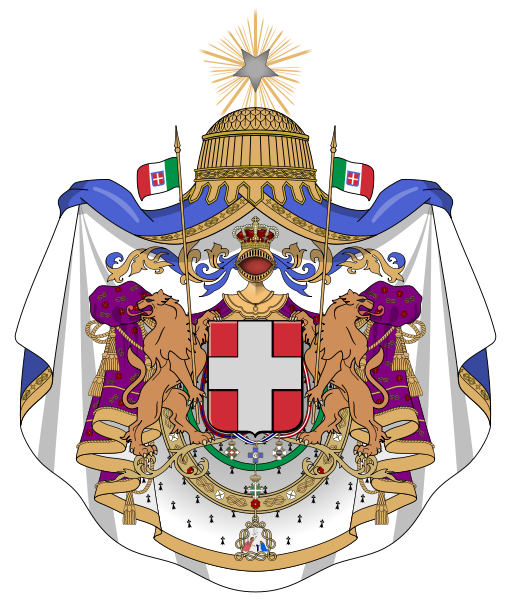
Seeing the defense of the Kingdom as a priority task now and to assist the recruitment efforts of the Ministry of War and General Staff, the Royal Ministry of Interior, with the aid of the local governors, would encourage the able men of Italy to join the ranks of Soldiers, within the regions of Lazio, Puglio, Sicily, Piedmont, Campania and Lombardia. If either civil authorities or military commanders would like to propose any alterations, we would be glad to hear of them.
Pending Business List III
Legislation:
Budget
Italian Fatherland Act
Croation Integration Act
No confidence vote against Di Cervo
Emergency Presidential Powers to Protect the Civil Order and Stability of this Italian Nation
Government Efficiency Act
Commemoration of the 1916 Revolution Act
Government Orders:
Finance and Commerce
Interior
Transportation
Foreign
Education
War
CoGS
Industrialists:
See commerce
mrlifeless is building a winery in the Sahara and furniture in Piedmont
Demagogues:
Andre Massena is agitating
Militarists:
Command structure + alterations
Last edited:

The Regency and Government of Italian Kingdom announce that for state treason, rebellion against the King and formation of illegal paramilitary units Adriano Cavalieri, Baron of Settimo, and Signor Vito Santini are sentenced to death through a firing squad. Adriano Cavalieri would be additionally stripped of his title as Baron of Settimo.
Last edited:
Name: Niccolo Cavalieri-Salvatore
Born: Frienze, July 7, 1884
Dynastic Relation: Marcello Cavalieri's, Brothers, son.
Class: Demagogue since I cant go back to capitalist for numerous more years yet.
Bio: Niccolo, grew up very similar to his cousin Adriano, but unlike Adriano was a much more relaxed and forward thinking. Moreover, Niccolo didn't think trying to start a militia when the government was strong was wise, unlike his cousin. So when he heard his cousin got arrested and then promptly sentenced to death Niccolo ruefully thought that his cousin did this to himself and almost destroyed the cause. Luckily Niccolo survived him, and in managing the trust of Adriano's little brother, has the wealth and influence needed to revive the Anarcho-Liberal agenda.
Born: Frienze, July 7, 1884
Dynastic Relation: Marcello Cavalieri's, Brothers, son.
Class: Demagogue since I cant go back to capitalist for numerous more years yet.
Bio: Niccolo, grew up very similar to his cousin Adriano, but unlike Adriano was a much more relaxed and forward thinking. Moreover, Niccolo didn't think trying to start a militia when the government was strong was wise, unlike his cousin. So when he heard his cousin got arrested and then promptly sentenced to death Niccolo ruefully thought that his cousin did this to himself and almost destroyed the cause. Luckily Niccolo survived him, and in managing the trust of Adriano's little brother, has the wealth and influence needed to revive the Anarcho-Liberal agenda.
((I'm back!))

Name: Carlo Marconi
DoB: 5th of August 1870
Class: Politician
Bio: Carlo was born in a middle class family on Sicily. When he grew up, he started noticing the poverty of the countryside and the endless rows of poor workers at the factories. He became interested in the works of Marx and Engels around the age of twenty-five. Initially he supported the communists seizing power in Italy, but after a while he considered the revolution a failure and called for bringing down the revolutionary government himself. Shortly after the revolution, he entered politics, having his own view on Marxism and Communism in general.

Name: Carlo Marconi
DoB: 5th of August 1870
Class: Politician
Bio: Carlo was born in a middle class family on Sicily. When he grew up, he started noticing the poverty of the countryside and the endless rows of poor workers at the factories. He became interested in the works of Marx and Engels around the age of twenty-five. Initially he supported the communists seizing power in Italy, but after a while he considered the revolution a failure and called for bringing down the revolutionary government himself. Shortly after the revolution, he entered politics, having his own view on Marxism and Communism in general.
Amat 1911-1913: Race to Reform
Amat's seizure of Rome in late 1910 and his formation of a new government (and subsequent promulgation of a constitution) in 1911 gave him an extremely tenuous hold on power. The population, it seemed, had tired of dictatorships over the thirty years of tumbling instability that had seen power pass from one authoritarian regime to another, without even the achievement of stability to show for grinding oppression. The national mood was simmering, still borderline revolutionary. Indeed, the Amat government would never truly establish control of Italy. No fewer than six militias cropped up during Amat's first three years in office, ranging in ideologies from communists to radical libertarians. While two of the most prominent militia leaders, Adriano Cavalieri and Vito Santini, were captured and shot before they could do much damage, many more political militias thrived in the lawlessness and attitude of anti-government sentiment. Terrorist bombings, brigandage, gun battles, and ambushes on government troops become commonplace, even within Rome itself. Defections also became common towards the end of 1912, with whole regiments disappearing into the countryside to fight for one cause or another throughout the winter.
Following his promulgation of a new constitution, which made broad promises for the restoration of democracy and civil liberties (always within limits set by the law), Amat set about crowning a new King. Umberto II, if he lived, would have been 7 in 1911, but he had not come forward. Most now assumed he was dead. The Amat regime therefore crowned Emanuele Filiberto, Duke of Aosta and son of Amadeo, King of Italy early in 1911.[1] In his first address to the cabinet (made in private), he recounted the curious story of how his father - King Amadeo I of Spain - had abdicated the Spanish throne after just two years in power, declaring the Spanish people to be ungovernable. Many wondered if there was a moral to this story.

1. Emanuele Filiberto, King of Italy.
Amat's foreign minister, the Duchess Bonaretti, quickly pursued alliance with Germany (which had done much for the Amat regime while it was in exile), the UK, and Belgium. These states all quickly agreed to alliances with Italy and German guarantees on Italian lands meant they were unlikely to be attacked any time soon. (Not that foreign attack seemed likely; the French were busy fighting the Spanish to a stalemate and the Austrians still had a communist insurgency to deal with.) However, the anarchy had once again rendered Italy the laughingstock of Europe and Bonaretti's attempts to rebuild the old Italian common market and trading sphere were rebuffed.
The Amat regime would invest heavily in the military, while the floundering tax base of the young government struggled to support the spending. Julius Vaccarello, the Minister of War, ordered numerous new regiments to aid in the fight against insurgent forces and possible foreign enemies. Antonio Escarra's interior ministry launched a mass campaign to recruit new troops for the military nation-wide. In collaboration with the War Ministry, the Count von Habsburg-Lorraine d'Annecy imported complicated naval plans for abroad, for a new and sophisticated type of British battleship called the "Dreadnought" - the General Staff almost immediately expressed interest in building the new ship - and also various new artillery pieces, carbines, equipment, explosives, and more. All of this cost money. Di Barnadi's finance ministry struggled to support the cost.
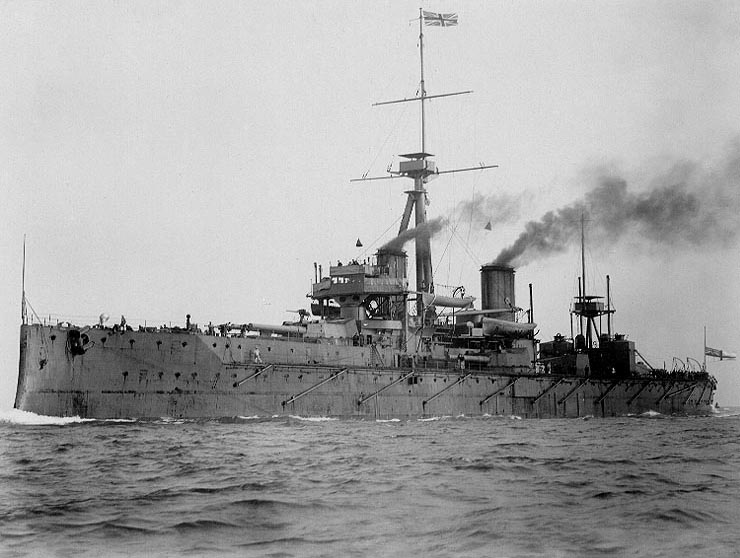
2. HMS Dreadnought, the first of a fearsome new class of warship
This drained funds meant for Michelangelo Ezzo's commerce ministry. He had restored ownership of factories to their owners under the Alliata-Balbo-era syndicalist schemes (albeit sometimes under government-controlled trusts), but lacked the funds to reopen many of these shuttered factories. While he had only ever planned to reopen about half of Italy's factories, the massive redirection of money into the military meant that the government was hard-pressed to do even this. It took most of 1911 to scrape together the cash, and even then subsidies were out of the question. Consequently, most of Italy's factories remained closed. The commerce ministry estimated that 500,000 working-age men were unemployed in 1912, and Italy's industrial output was lower than it had been in decades, barely half what it had been under the Communists.
Naturally, this didn't much endear the Amat regime to the public. In charge of placating the angry masses was Federico Zachary Fabron-D'Ambrosio. The D'Ambrosio dynasty had a long history of deaths in the family; Federico at least was determined to live. Amat quickly passed a minimum wage, unemployment subsidies, and legalized public assemblies. When these public assemblies led to rather a lot of protests against the poor economic and political conditions, Amat's government rapidly started to restart the shuttered public school system. He also oversaw penal reform - trying to soften the public perception of political imprisonment - and ultimately guaranteeing a minimum standard of healthcare to the very poor.
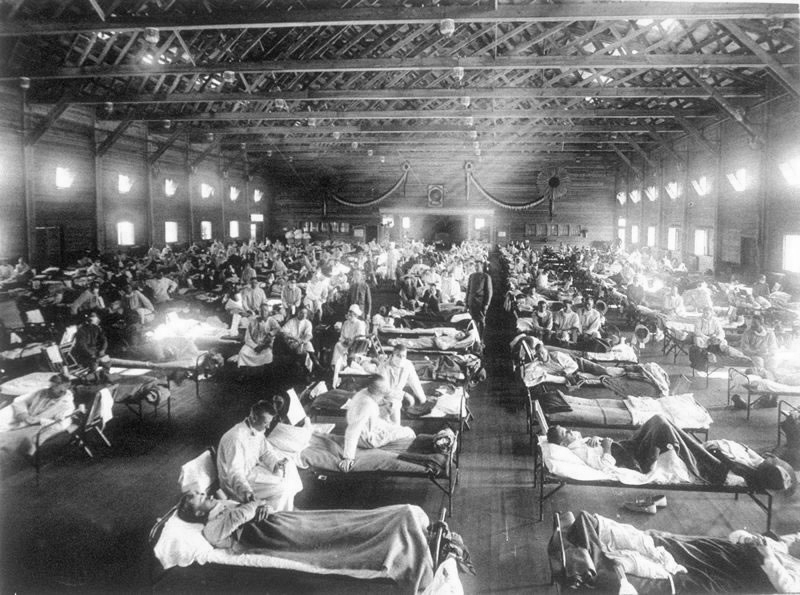
3. Influenza outbreaks were common and deadly in the early 19th century
Still, none of these reforms really addressed what the public wanted. They wanted suffrage, the right to vote and choose their own leaders, something that they hadn't had in three decades. Alliata had tried to give it to them and been overthrown. So had the communists. Amat was in a marginally better position than either and had theoretically guaranteed that elections would occur through his constitution. Still, there was only talk of letting the landed gentry vote from the Amat regime. This didn't sit well with the general public.
On July 31st, 1913, Italy's first general strike in years broke out. Workers and others campaigned in the streets, demanding a return to democracy. Though it was the most violent general strike that Italy had ever had, with protesters openly clashing with the constabulary and soldiers, Amat - having learned from his long string of dead predecessors - refused to order his army to shoot the strikers. Instead, he withdrew his troops and opened negotiations with the strikers.
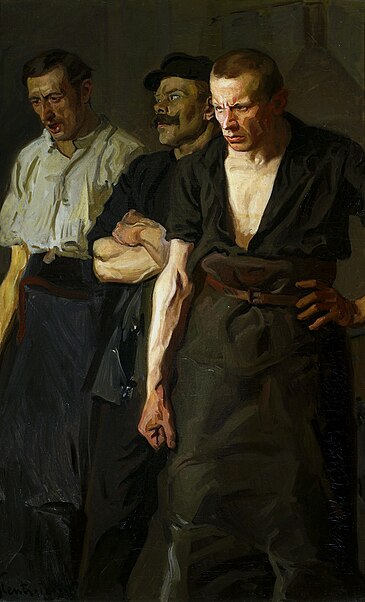
4. Pro-regime portrayal of Italian workers during the General Strike
The regime's opening offer was for Landed voting and no legal opposition parties. They conceded legal opposition parties - no matter how radical - on the second day of the strike and a "weighted wealth" voting system, then merely a wealth requirement for voting later in the week. They also agreed to guarantees against harassment for the opposition and to draw electoral districts along historical lines and formulaic lines rather than allowing a political process, which effectively put an end to the possibility of gerrymandering. The General Strike ended on August 9th, with Amat's regime promising elections early the next year.
Democracy had returned to Italy, but not democracy for everyone. There was a wealth cutoff for the vote, making it unlikely that many of the unemployed masses would have a say at the ballot box. Women also lacked the vote (then again, so did most men). Suffragettes staged a huge march on the 25th of December of that year - the Christmas March on Rome - to try to win support for their cause. They were ignored. Still, for the first time in years, Italy was beginning to look like a democracy again.
[1]Prior to Emanuele Filiberto's coronation, Duke Thomas of Genoa had represented the House of Savoy in the Amat regime.
----------------------------
Player Actions Needed:
We're now in the four-day pre-election period for the first time in real-life months and in-game years. This period will last until the 16th of July, 2015, 7 PM PST (17th of July 2015, 3 AM GMT). Form parties. Nominate leaders. These parties will stand at the general election. As far as I know, we're back to first past the post so I will also be requiring parties to declare themselves as either regional or national.
Note: Owing to the much larger number of regions Italy has now than it did before, regional parties may move into or abandon up to 2 regions every election instead of one.

Michelangelo Ezzo ((mrlifeless))
Piedmont fabric: 0(bankrupt)
Piedmont Regular clothes: 12410(bankrupt)
Lombardy dyes: (Doesn't exist)
Lombardy electric gears: 0(bankrupt)
Romagna fabric: 0(bankrupt)
Romagna Regular clothes: 11680(bankrupt)
Savoy Regular clothes: 2190(bankrupt)
Toscana Automobiles: 0(Under construction)
Campania Fabric: 0(bankrupt)
Campania Regular Clothes: 12045(bankrupt)
Campania Luxury Clothes: 61685
Campania Dyes: 0(bankrupt)
Lazio Regular Clothes: 8760(bankrupt)
Lazio Luxury Clothes: 60955(bankrupt)
Gross Profit: 169725
Corporate Tax: -76376
Net Profit: ~93300
Firehound (In Trust)
Piedmont ammunition: 37230
Puglia ammunition: 33215
Puglia steamers: 0(bankrupt)
Romagna small arms: 2920
Sardinia ammunition: 28835
South Tirol small arms: 730
Toscana small arms: 4745
Venice Steamers: 0(bankrupt)
Sicily artillery: 49275
Sicily explosives: 25550
Lazio artillery: 56575
Lazio ammunition: 36865
Campania small arms: 5840
Campania artillery: 56940
Emilia ammo: 40880
Gross Profit: 379600
Corporate Tax: -170820
Net Profit: ~208800
Nodscouterr:
Emilia Machine Parts: 0(closed)
Lazio Steel: 0(closed)
Lombardia Steel: 0(closed)
Lombardia Machine Parts: 0(closed)
Toscana Steel: 0(closed)
Gross Profit: 0
Corporate Tax: -0
Net Profit: ~0
Silvio Ferrabino (Terraferma)
Piedmont Liquor: 36865
Piedmont Wine: 55845
Lombardia Wine: 0(closed)
Venetian Wine: 15330
Gross Profit: 108040
Corporate Tax: -48618
Net Profit: ~59400
Donato Ceruso (Canadian) (In Trust)
Sardinia cement: 22265
Sardinia glass: 27740
Puglia glass: 0(bankrupt)
Savoy cement: 0(bankrupt)
Toscana cement: 0(bankrupt)
Toscana glass: 0(bankrupt)
Venice glass: 0(bankrupt)
Campania cement: 0(bankrupt)
Gross Profit: 50005
Corporate Tax: -22502
Net Profit: ~27500
Otto (In Trust, profits confiscated)
Puglia paper: 45625
South Tirol lumber: 0(bankrupt)
Lazio luxury furniture: 0(bankrupt)
Emilia lumber: 3285
Gross Profit: 48910
Corporate Tax: -22009
Net Profit: ~26900
Total Corporate Tax Due: 340325 (less tax efficiency)
Last edited:
((I'd also ask you wait for parties to exist before you run for their leaderships...))
Sixty-five years ago my grandfather saved the Kingdom of Sardinia-Piedmont from anarchy and revolution and ushered in an era of peace and prosperity in Sardinia. Now the Marchese di Soleminis has repeated the same feat on a larger scale and during an even more dire crisis. Let us hope a golden age for Italy shall follow.
For his courageous work during these difficulties I propose that the Marchese di Soleminis be named Savior of the Realm and I shall give the Boanretti family title, Marchese di Vittoria, to him.
-Princess Rosa Bonaretti-Wittelsbach, Duchess of Venezia, Countess of Nizza.
((Private))
Rosa was done with Italy.
"Damn these feckless people. They are all ungrateful vermin," she said to her maid, Julia.
"Would you like me to pack your undies, signora?" Julia asked.
"They do not know what they want- the only thing they know is how to kill," Rosa fumed as she threw one of her silks into a random bag. "Goodbye and good riddance to this awful peninsula."
The Duchess left Rome with her entourage. They made a brief top in Nizza to check on the estate, which was being slowly rebuilt. One of the cadet branches could have it, she supposed. Then, she flew by Torino, that wretched hive of scum and villainy, and into the Swiss mountains.
And so the Duchess of Venice and Crown Princess of Bavaria returned to her family in Germany...for now.
For his courageous work during these difficulties I propose that the Marchese di Soleminis be named Savior of the Realm and I shall give the Boanretti family title, Marchese di Vittoria, to him.
-Princess Rosa Bonaretti-Wittelsbach, Duchess of Venezia, Countess of Nizza.
((Private))
Rosa was done with Italy.
"Damn these feckless people. They are all ungrateful vermin," she said to her maid, Julia.
"Would you like me to pack your undies, signora?" Julia asked.
"They do not know what they want- the only thing they know is how to kill," Rosa fumed as she threw one of her silks into a random bag. "Goodbye and good riddance to this awful peninsula."
The Duchess left Rome with her entourage. They made a brief top in Nizza to check on the estate, which was being slowly rebuilt. One of the cadet branches could have it, she supposed. Then, she flew by Torino, that wretched hive of scum and villainy, and into the Swiss mountains.
And so the Duchess of Venice and Crown Princess of Bavaria returned to her family in Germany...for now.
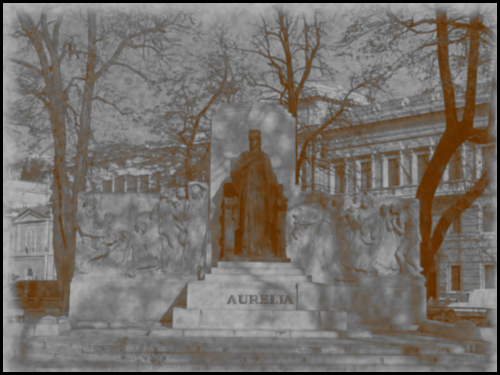
In her home town of Gaeta, the recent return of constitutionalism to Italy allowed Muti's two sisters to make the pilgrimage to a new statue erected in her honour, where they led the gathered crowd in remembrance and laid flowers. The statue was designed by young artist Michele di Grosseto and paid for by donations from various organisations across the country – notably, the revived version of Il Pasquino, the satirical periodical whose staff occasionally comprised Miss Muti during its original print run. Sig. di Grosseto has also designed a status honouring the late Felix, Baron Profumo, which stands in Genoa. […]
((Whoa. Hold on. You built the dreadnought?!! I explicitly told you not to because of the cost...))
- 1
Carlo Marconi in an open letter published in a newspaper
"To all those who are roaming the countryside with their militias, to all those who are fighting for the ideals of communism or anarchism, I ask you to lay down your arms. To my communist brothers: the people need peace and stability, there's no point to keep on fighting. A violent revolution is not the way to go comrades, as it will only cause the loss of human lives, and a human life is the most valuable thing in the world. The road to democracy is open, and so is the road to a democratic revolution. A revolution with no bloodshed, but a revolution in the way of thinking. Democracy allows the people to express their voices, and although we are far removed from a true democracy, I believe that universal suffrage and rights for everyone aren't things from our dreams, but I'm sure that within a decade it could be achieved. That is, if you lay down your weapons. Trough democracy, we can achieve more then we ever can trough violence, we can wake up the masses by allowing them to choose their own future, and slowly we can start building to the ultimate society. Yes it will take time, but it has a greater chance of success than a violent revolution, as like shown a few years back, when literally no unity was formed and nothing was achieved. Lay down your arms comrades, and let's build a better world together."
"To all those who are roaming the countryside with their militias, to all those who are fighting for the ideals of communism or anarchism, I ask you to lay down your arms. To my communist brothers: the people need peace and stability, there's no point to keep on fighting. A violent revolution is not the way to go comrades, as it will only cause the loss of human lives, and a human life is the most valuable thing in the world. The road to democracy is open, and so is the road to a democratic revolution. A revolution with no bloodshed, but a revolution in the way of thinking. Democracy allows the people to express their voices, and although we are far removed from a true democracy, I believe that universal suffrage and rights for everyone aren't things from our dreams, but I'm sure that within a decade it could be achieved. That is, if you lay down your weapons. Trough democracy, we can achieve more then we ever can trough violence, we can wake up the masses by allowing them to choose their own future, and slowly we can start building to the ultimate society. Yes it will take time, but it has a greater chance of success than a violent revolution, as like shown a few years back, when literally no unity was formed and nothing was achieved. Lay down your arms comrades, and let's build a better world together."
- 1

